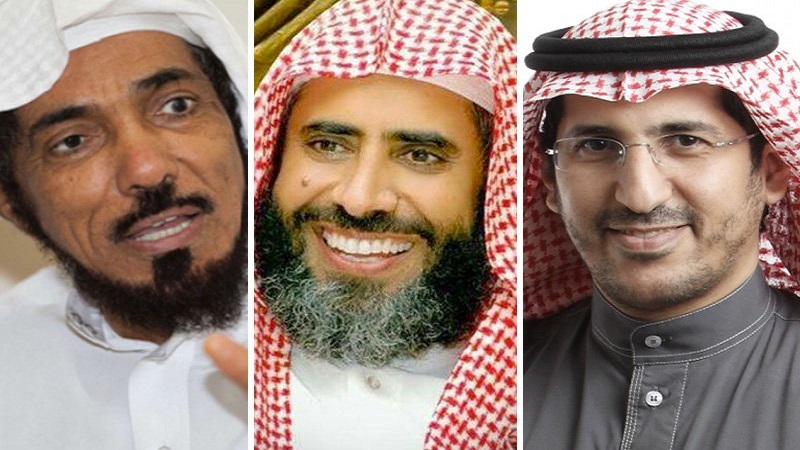Despite international condemnation over its growing increase of human rights abuses, Saudi Arabia continues to act with impunity. So says analyst Na’eem Jeenah from the Afro-Middle East Centre, in the wake of reports that the Saudi Kingdom plans to execute three prominent moderate Saudi scholars. According to the Middle East Eye, Sheikh Salman al-Odah, Shaykh Awad al-Qarni and Shaykh Ali al-Omari, are being held on multiple charges of “terrorism” and will be sentenced to death after Ramadan.
The most influential of the three is Sheikh Salman al-Odah, an internationally renowned alim and writer. Shaykh Awad al-Qarni is also an academic and author and Shaykh Ali al-Omari has made his mark in broadcasting. The three scholars have massive followers online, with Al-Odah’s Twitter account in excess of 13 million followers alone.
As high-profile figures, they are seen to be political dissents given their critique of the Saudi government.
In May 2017, Saudi Arabia, United Arab Emirates (UAE), Bahrain and Egypt severed diplomatic ties with Qatar and imposed a land, air and sea blockade. On September 9 2017, Shaykh Al-Odah posted a tweet saying: “May God harmonise between their hearts for the good of their people” – a cryptic tweet but one which observers viewed as a call for the reconciliation between the Gulf countries.
“Sheikh Salman al-Odah was difficult to put in a pigeonhole. He seems to be the kind of scholar that is guided by his conscience rather than what anyone else wants him to say. For the Saudis, this is a huge problem,” says Jeenah.
Shaykh al-Qarni, like al-Odah, was a huge critic of the Saudi led blockade on Qatar.
Shaykh al-Omari is considered a huge advocate of women’s rights and has been a campaigner against Muslim extremism.
The scholars were arrested in September 2017 and have been held in detention since then.
“Their concern was that there are families are based in both Qatar and Saudi Arabia and that there should be unity. They didn’t say anything political. But these days, even mentioning the name Qatar can get you locked up,” says Jeenah.
Saudi detainees, in most cases, do not have the right to legal representation and often do not know what they are being charged for.
“Subsequently, when Salman Al-Odah appeared in court, he was accused by the special prosecutor of 37 charges of terrorism. The excuse [by the prosecutors] was the tweet but they made references to terrorist organisations and accusations of exposing injustices against businesses and expressing cynicism of the government’s achievements. He was also accused of being related to the Qatari royal family. So on this basis, he was sentenced to be executed,” Jeenah explains.
Many political commentators have argued that the Saudi regime has been emboldened by the position of US president Donald Trump. Following the brutal death of prominent Saudi journalist Jamal Khashoggi in a Saudi embassy in Istanbul in October year, President Trump has refused to entertain allegations that Saudi Prince Muhammad Bin Salman was involved in the murder. Trump has publicly supported MBS, despite a CIA assessment that he ordered the killing of Khashoggi and pleas from US senators to condemn the kingdom’s de-facto ruler.
In an action condemned by the United Nations and human rights groups as a flagrant violation of international law, Saudi Arabia beheaded 37 people last month for terrorism-related crimes, amongst them a teenager.
“Last month’s public beheading didn’t evoke the outrage around the world, that one would think it would evoke. Imagine if Abubakr Al Baghdadi’s men had beheaded these people? But this is the Saudi Kingdom and it’s a sovereign state…so its not a big deal. Clearly for the Saudis this was an indication that within the current climate, it can do whatever it likes.”
According to political analyst Lubna Nadvi, the Saudi government does not have a culture of allowing citizens to be critical of its policies or actions.
“Across the Middle East, there are conservative societies where speaking out is considered unacceptable. But the Saudi government has become extreme,” she said.
“The fact that the Saudi government has chosen to arrest, detain and kill people publicly, it is showing it wants to threaten others who might dare to speak up against them.”
This possible execution of these three scholars has elicited condemnation from Human Rights Watch (HRW), Reprieve and Amnesty International, but whether it will have any impact is uncertain. Jeenah says despite Saudi Arabia being a member of the UN Human Rights Council, it continues to act with impunity.
“Where is the huge outrage? There’s always a few noisy people on the side-lines, but that too will pass soon.”
Listen to the interview here:
VOC






 WhatsApp us
WhatsApp us 

